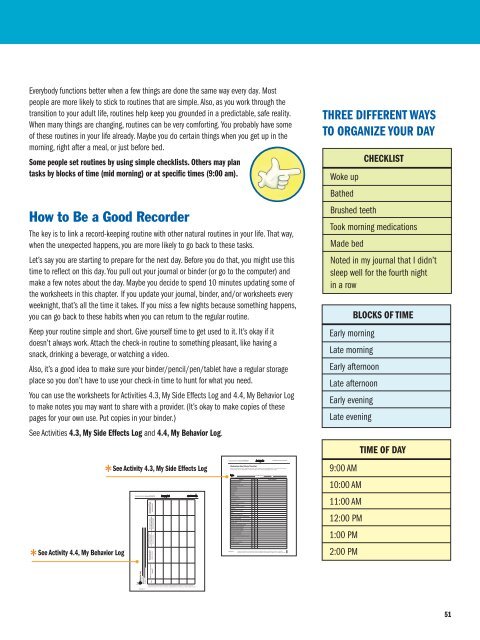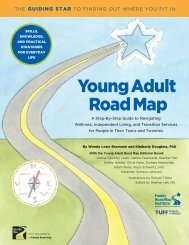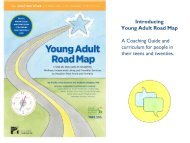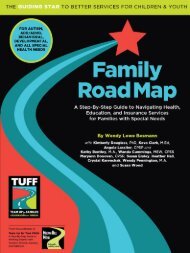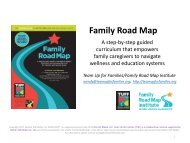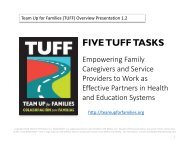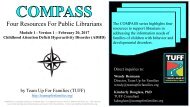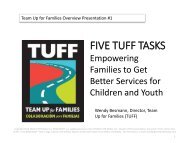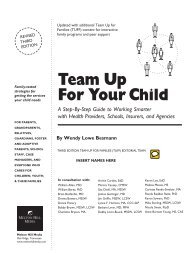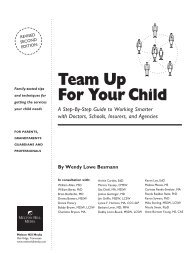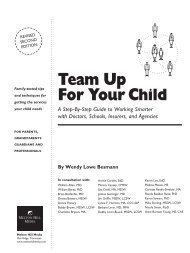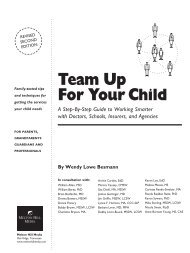Look Inside Young Adult Road Map
Create successful ePaper yourself
Turn your PDF publications into a flip-book with our unique Google optimized e-Paper software.
Guiding Star Point Four: Manage INFORMATION Activity 4.4 <strong>Young</strong> <strong>Adult</strong> <strong>Road</strong> <strong>Map</strong>,<br />
Activity 4.4<br />
<strong>Young</strong> <strong>Adult</strong> <strong>Road</strong> <strong>Map</strong>: A Step-by-Step Guide to Navigating Wellness, Independent Living, and Transition<br />
Services for People in Their Teens and Twenties. Copyright ©Melton Hill Media, LLC, 2018. All rights reserved.<br />
Activity 4.3<br />
<strong>Young</strong> <strong>Adult</strong> <strong>Road</strong> <strong>Map</strong> Supplemental<br />
Make one checklist for each medication you take. Take it along to the next appointment. If any terms on this sheet<br />
are unfamiliar, ask your pharmacist or doctor to explain. Ask for help completing this if you need it.<br />
SYMPTOM YES NO OTHER COMMENTS<br />
General Body Functions<br />
Sleep<br />
Muscles and movement<br />
Mental function and attitude<br />
Any other symptoms<br />
<strong>Young</strong> <strong>Adult</strong> <strong>Road</strong> <strong>Map</strong>: A Step-by-Step Guide to Navigating Wellness, Independent Living, and Transition<br />
Services for People in Their Teens and Twenties. Copyright © 2018, Melton Hill Media, LLC. All rights reserved.<br />
Everybody functions better when a few things are done the same way every day. Most<br />
people are more likely to stick to routines that are simple. Also, as you work through the<br />
transition to your adult life, routines help keep you grounded in a predictable, safe reality.<br />
When many things are changing, routines can be very comforting. You probably have some<br />
of these routines in your life already. Maybe you do certain things when you get up in the<br />
morning, right after a meal, or just before bed.<br />
Some people set routines by using simple checklists. Others may plan<br />
tasks by blocks of time (mid morning) or at specific times (9:00 am).<br />
How to Be a Good Recorder<br />
The key is to link a record-keeping routine with other natural routines in your life. That way,<br />
when the unexpected happens, you are more likely to go back to these tasks.<br />
Let’s say you are starting to prepare for the next day. Before you do that, you might use this<br />
time to reflect on this day. You pull out your journal or binder (or go to the computer) and<br />
make a few notes about the day. Maybe you decide to spend 10 minutes updating some of<br />
the worksheets in this chapter. If you update your journal, binder, and/or worksheets every<br />
weeknight, that’s all the time it takes. If you miss a few nights because something happens,<br />
you can go back to these habits when you can return to the regular routine.<br />
Keep your routine simple and short. Give yourself time to get used to it. It’s okay if it<br />
doesn’t always work. Attach the check-in routine to something pleasant, like having a<br />
snack, drinking a beverage, or watching a video.<br />
Also, it’s a good idea to make sure your binder/pencil/pen/tablet have a regular storage<br />
place so you don’t have to use your check-in time to hunt for what you need.<br />
You can use the worksheets for Activities 4.3, My Side Effects Log and 4.4, My Behavior Log<br />
to make notes you may want to share with a provider. (It’s okay to make copies of these<br />
pages for your own use. Put copies in your binder.)<br />
See Activities 4.3, My Side Effects Log and 4.4, My Behavior Log.<br />
See Activity 4.4, My Behavior Log<br />
*<br />
*<br />
See Activity 4.3, My Side Effects Log<br />
My Behavior Log<br />
Behavior Log for:<br />
Medications:<br />
Log begun (month, day, and year):<br />
What happened AFTER the<br />
behavior took place? (What<br />
actions did you take?<br />
Other comments, details, or<br />
factors involved? (Meds change?<br />
Illness? Event in family?)<br />
What was taking place right before<br />
the behavior happened?<br />
(Example: Change in family plans,<br />
argument with sibling.)<br />
Where and when did the<br />
behavior take place?<br />
(Example: At school,<br />
What were you feeling when this<br />
happened?<br />
Date<br />
Guiding Star Point Four: Manage INFORMATION Activity 4.3<br />
Medication Side Effects Checklist<br />
Name: From Month/Day to<br />
Medicine:<br />
Dosage:<br />
Mouth feels too dry<br />
Drooling or too much saliva<br />
Losing weight<br />
Gaining weight<br />
Constipation<br />
Nausea<br />
Vomiting<br />
Trouble urinating<br />
Urinating frequently<br />
Blurry vision<br />
Problems with sexual function<br />
Change in breasts<br />
Changes in menstrual periods<br />
Headache<br />
Lightheadedness, dizziness<br />
Sleepiness, sleeping a lot<br />
Trouble getting to sleep or staying asleep<br />
Feeling restless or jittery, cannot stay still<br />
Muscles stiff<br />
Slowness, trouble getting moving<br />
Shaking or muscle trembling<br />
Memory problems, forgetful<br />
Low energy, easily tired<br />
Difficult to concentrate<br />
Too much activity or “pressured” speech<br />
Irritable<br />
Anxious<br />
Thoughts about self-harm<br />
Three different ways<br />
to Organize Your Day<br />
Checklist<br />
Woke up<br />
Bathed<br />
Brushed teeth<br />
Took morning medications<br />
Made bed<br />
Noted in my journal that I didn’t<br />
sleep well for the fourth night<br />
in a row<br />
Blocks of time<br />
Early morning<br />
Late morning<br />
Early afternoon<br />
Late afternoon<br />
Early evening<br />
Late evening<br />
9:00 AM<br />
10:00 AM<br />
11:00 AM<br />
12:00 PM<br />
1:00 PM<br />
2:00 PM<br />
Time of day<br />
51


